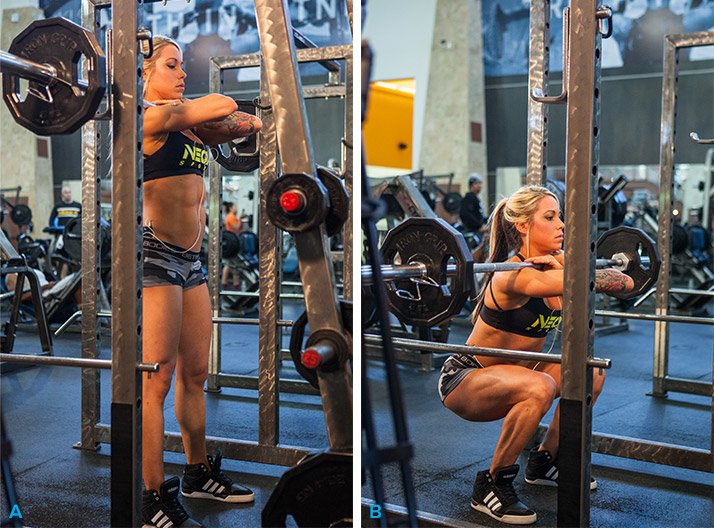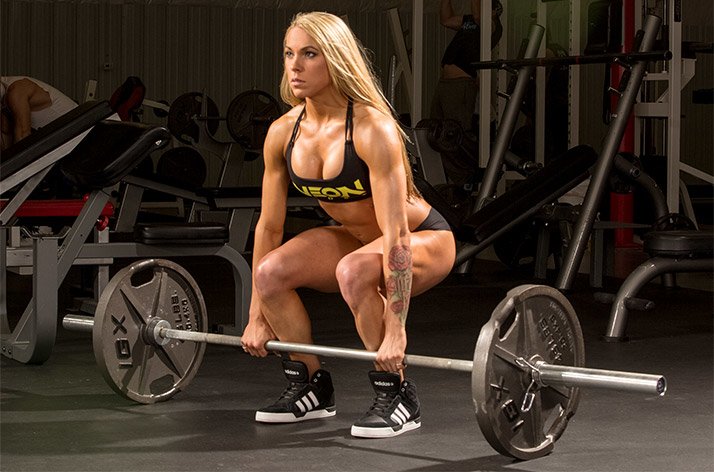
Ashley Hoffmann's 5 Rules Of Building Strength!
Building strength isn't always as simple as "lift heavier." Follow these 5 rules to gear your mind, program, and nutrition toward your goals!
If you're not a powerlifter, you might be asking yourself, "Why should I care about getting stronger?" Even if your goals are entirely focused on how you look and feel, a little extra strength can pay off big time! Strength is a foundational quality of fitness, and it's definitely worth your time.
Many women find that spending a few weeks or months focusing on strength allows them to get more out of, well, everything. If you work on full-body strength, you'll make progress on weak spots you know about—and some you may not know about. You'll also be able to pursue future muscle building or fat loss with extra power and oomph. Plus, those who devote themselves to strength for a while can attest that moving a heavy barbell just feels different—in an awesome kind of way.
But training for strength comes with its own set of rules. You need to have the fundamentals down—not only in terms of technique, but also your mental approach and overall lifestyle.
Fitness model and Neon athlete Ashley Hoffmann is a woman who prioritizes being strong, as well as looking great. Here are her five rules for getting stronger that nobody ever told you about—until now.
Eat Well, and Eat Enough
Experienced athletes and coaches know that, along with being one of the slowest attributes to develop, strength is one of the most demanding. You can do a lot wrong and still get lean or muscular, but strong? Not likely, or at least not past a certain beginning stage. That applies to form of course, but also nutrition. If you're training to be strong but eating to be weak, you're setting yourself up to fail!
In other words, you need calories. "If your goal is to go gain maximum strength, you simply must eat to grow strong," Hoffmann says. "And protein isn't the only important macronutrient that you have to take in. Get enough fats and carbohydrates, as well. Both of these provide the body with energy to fuel your tough workouts."
Ideally, you shouldn't be operating in a caloric deficit for months on end anyway. But if you're going to focus on building strength for a while, you definitely shouldn't. Consider this the time to go back up to maintenance-level calories, and possibly into a slight caloric excess.
Trust Hoffmann when she says that the extra strength you gain will make the tradeoff well worth it! Aim for at least a gram of protein per pound of body weight daily, and don't be shy with your carbs. This is not the time to cut them and risk hindering your short-term performance.
Time Your Workouts Right
What time of day are you strongest? It's probably a question you've never considered. You just work out when your schedule allows, right? But lifters who focus seriously on strength ponder every variable that might help them move more weight—including the clock.

For Hoffmann, training later in the day has helped her strength and performance. "I personally train in the early afternoon or evening because I have time to get more of my meals in throughout the day," she says. "This translates to added fuel for my workouts."
Most people will also find they are naturally stronger later on in the day, when they are fully awake and not stiff from sleeping, as compared to exercising first thing in the morning. If you want to do morning sessions, consider doing cardio at this time. Then save your heavy lifting for the afternoon or evening.
Track both rep progress and weight progress
When adding muscle is the goal, it's common to take most sets to failure, no matter how heavy the weight. But when strength is the goal, it's more important to get quality reps, even if this means you leave a couple of reps in the tank for most sets.
The downside to this approach, you'll quickly find, is that you can't necessarily add weight every time you train. "The key is to gradually increase the weight," says Hoffmann. "When you increase the loads on your muscles, you force them to respond and adapt to this new demand. Give them time to adjust and get stronger to handle that load you're placing on them."
So how does Hoffmann know she's getting stronger? She says she tries to increase either the load or the reps each time she trains. This way, once she hits a certain rep target—usually 8 clean reps in a set—she knows she's ready to increase the load. Then, it's just rinse and repeat at the new weight.
"Each week, try to beat last week's weight or reps. Even if it's a small increase, it's still progress," she advises. "Just be sure to track each workout so you know exactly what you did and how much you're progressing."
It only takes a second to jot down how much weight and how many reps you do in your phone or in a notepad. Do this during or immediately after the workout is done. Then review those numbers and set new targets before you go in for your next session.
Know your "big five"
Machines have their place—and that place is helping produce muscle growth. Strength is not where they shine. If you want to get stronger, free weights can't be beat.
"Free weights will increase your overall strength by recruiting more muscle fibers to stabilize and assist the main working muscles," Hoffmann explains. "Using free weights instead of machines will also help strengthen muscular imbalances."
Of course, it can be hard—if not impossible—to get stronger at lots of movements at the same time. This is why Hoffmann likes to focus her strength work on only five tried-and-true movements at a time.
"Focus on getting stronger at the most important compound movements. My big five are squats, deadlifts, bench presses, bent-over rows, and the overhead press," she says. "All of these movements allow you to lift heavier weights to overload the muscles. This is what causes strength gains."

If you're following a body-part split, these moves should always be done at the start of each session, when you're freshest. This is especially the case if you're going to work in a strength rep range like 3 sets of 5-8 reps or 5 sets of 5 reps.
Use these sets to gauge your progress. Then, if you want to hit the machines afterward for some muscle-building, you can do it confident that you've gotten the most important work out of the way!
Get Serious About Your Sleep
Working in that range of 5-8 reps per set can be sneakily tough. Some days, the bar moves so easily, you can't believe it. Other days, it's a fight for your life. What's the difference between those two days? In many cases, it's how well rested you are.
"It may sound silly, but without adequate sleep, your body cannot repair itself the way it should from strength-focused training. This leaves you fatigued and weak," Hoffmann explains. "Our bodies naturally release human growth hormone at night, which improves your muscle recovery and regeneration."
Additionally, strength-focused training uses far more than just your muscles. It also taxes your nervous system heavily. And sleep is essential for nervous-system recovery! When you're trying to get stronger, getting a full night of sleep is a must.
Put it all together
When you're training with lighter weights and higher reps, you can get away with more questionable technique. But when you're dealing with a heavy barbell, form becomes crucial—and losing it can mean instant injury.
That may sound like a warning—and it is—but it's also a major positive. Improve your form on big lifts, and you'll see a cascade of positive effects. You'll be able to do more quality work in less gym time, move heavier weights in your muscle-building and fat-burning training, and even be better able to access that sometimes elusive mind-muscle connection. Simply put, Hoffmann says, "Just a little more strength can change everything."
Come to think of it, these are all things you should probably be doing anyway, right? Spending some time getting stronger might be just the thing to make you a better lifter for the long term. And that can be a game-changer no matter what your goals are!

